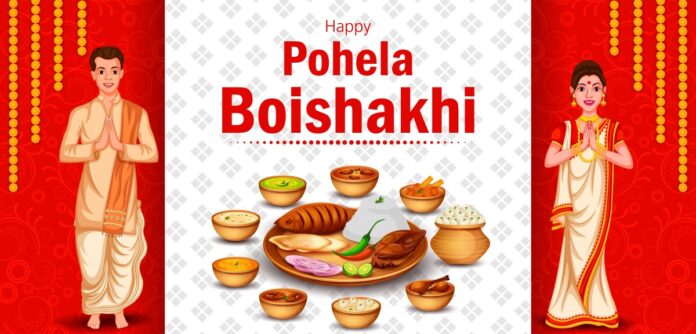Bengali New Year 2024
The Bengali New Year 2024, also known as Poila Baisakh, is celebrated with much enthusiasm and festivity in the Indian state of West Bengal and the Bengali-speaking regions of India and Bangladesh. This colorful festival marks the beginning of the Bengali calendar year and is a time for new beginnings, cultural performances, and delicious traditional food. Let’s delve into the history, significance, and customs associated with Poila Baisakh.
Poila Baisakh History
Poila Baisakh, the Bengali New Year, has a rich history that dates back centuries. Its origins can be traced to the Mughal period in India, particularly during the reign of Emperor Akbar in the 16th century. The Mughal Empire, known for its administrative reforms, introduced the Bengali calendar as part of its efforts to streamline the collection of taxes, which were based on the agricultural cycle.
The Bengali calendar, also known as the Bangabda, was introduced in the year 1584 CE (1091 Bengali year) by a royal decree known as the “Tarikh-e-Ilahi.” This calendar is a luni-solar calendar, similar to the Hindu calendar, with years divided into 12 months and days based on the movements of the moon.
Poila Baisakh falls on the first day of the Bengali calendar month of Baisakh, which usually corresponds to mid-April in the Gregorian calendar. The word “Poila” means “first,” and “Baisakh” is the name of the first month. Hence, Poila Baisakh signifies the beginning of the new year in the Bengali calendar.
During the Mughal era, Poila Baisakh was an occasion for farmers to settle their dues with the landlords and start a new agricultural cycle. It was also a time for traders and businessmen to close their old accounts and start fresh ones. The day was marked by feasting, music, and cultural performances, symbolizing new beginnings and prosperity.
Over the centuries, Poila Baisakh has evolved into a major cultural festival in Bengal, celebrated with great fervor and enthusiasm. It is a time for people to wear new clothes, decorate their homes, visit temples, and participate in various cultural programs and fairs. The day is also marked by the exchange of greetings and sweets among friends and family members.
Poila Baisakh is not just a festival; it is a celebration of Bengali culture, heritage, and tradition. It reflects the spirit of unity and solidarity among the Bengali community, as they come together to welcome the new year with hope, joy, and optimism for the future.
Bengali New Year 2024 Date
In 2024, Poila Baisakh or Bengali New Year falls on 14th April, which coincides with the New Year’s Day as per the traditional Bengali calendar.
Poila Baishakh Meaning
- The term “Poila Baisakh” is derived from the Bengali words “Poila,” meaning first, and “Baisakh,” which is the first month of the Bengali calendar.
- It symbolizes the beginning of the agricultural season when farmers start plowing their fields and sow seeds.
How is Bengali New Year Celebrated?
The Bengali New Year, known as Poila Baisakh, is celebrated with immense enthusiasm and traditional fervor in West Bengal, Bangladesh, and among the Bengali communities worldwide. The day is marked by various customs, rituals, and festivities that reflect the rich cultural heritage of Bengal. Here’s how Poila Baisakh is celebrated:
- Early Morning Rituals: The day begins with an early morning ritual bath, known as “Mahashnan.” People visit nearby rivers, ponds, or temples to take a holy dip, symbolizing purification and the washing away of sins.
- Wearing New Clothes: Poila Baisakh is an occasion for people to wear new clothes. Women typically wear traditional white saris with red borders, known as “Laal Paar Sari,” while men wear dhoti-kurta or panjabi.
- Decoration: Homes and establishments are decorated with alpana (floral designs) and rangoli patterns to welcome the new year. Mango leaves and flowers are used to adorn the entrances, symbolizing prosperity and good fortune.
- Visiting Temples: People visit temples to offer prayers and seek blessings for the new year. Temples, especially those dedicated to Goddess Kali, are decorated with flowers and lights.
- Cultural Programs: Cultural programs featuring traditional music, dance, and drama are organized in various parts of Bengal. These programs showcase the rich cultural heritage of Bengal and are attended by people of all ages.
- Fairs and Festivities: Markets are bustling with activity, with people shopping for new clothes, jewelry, and household items. Fairs are also held in many places, offering various attractions and entertainment options.
- Exchanging Greetings: People exchange greetings and sweets, such as “Panta Bhat” (fermented rice), “Aamer Chatni” (mango chutney), and “Shondesh” (a sweet delicacy), with friends, family, and neighbors.
- Community Feasts: Special feasts are prepared, and families and friends come together to enjoy traditional Bengali cuisine. Popular dishes include “Ilish Bhapa” (steamed Hilsa fish), “Cholar Dal” (Bengal gram lentils cooked with coconut and spices), and “Shorshe Ilish” (Hilsa fish cooked in a mustard gravy).
- Cultural Processions: Processions known as “Prabhat Pheri” are taken out in the early morning, featuring traditional music and dance performances. These processions add to the festive atmosphere of Poila Baisakh.
Overall, Poila Baisakh is a time of joy, renewal, and cultural celebration for the Bengali community. It is a time to cherish the traditions of the past while embracing the opportunities of the future.
Bengali New Year Special Food
Poila Baisakh, the Bengali New Year, is not only a time for cultural celebrations but also a culinary delight. The festival is marked by the preparation and consumption of special dishes that are an integral part of the festivities. Here are some of the traditional Bengali New Year special foods:
- Panta Bhat: Panta Bhat is a traditional Bengali dish made with leftover rice soaked in water overnight. It is typically served with fried fish, pickles, and green chilies. The fermentation process gives it a unique tangy flavor.
- Ilish Bhapa: Ilish Bhapa is a popular Bengali dish made with Hilsa fish marinated in mustard paste and steamed to perfection. It is a delicacy enjoyed during special occasions like Poila Baisakh.
- Cholar Dal: Cholar Dal is a Bengali-style lentil dish made with Bengal gram lentils cooked with coconut, raisins, and spices. It is often served as part of the festive meal on Poila Baisakh.
- Shorshe Ilish: Shorshe Ilish is another Hilsa fish delicacy prepared with a mustard gravy. The strong, pungent flavor of mustard complements the rich taste of the fish, making it a favorite among Bengalis.
- Aamer Dal: Aamer Dal is a tangy lentil soup made with green mangoes, lentils, and spices. It is a refreshing dish that is perfect for the summer season, which coincides with Poila Baisakh.
- Shondesh: Shondesh is a popular Bengali sweet made with fresh cottage cheese (chhena) and sugar. It is often flavored with cardamom, saffron, or other ingredients and shaped into small, bite-sized pieces.
- Rasgulla: Rasgulla is a classic Bengali sweet made with chhena (cottage cheese) and sugar syrup. These soft and spongy sweets are a favorite among people of all ages and are often served during festive occasions.
- Mishti Doi: Mishti Doi is a sweet yogurt dessert that is a must-have during Poila Baisakh. It is made by fermenting sweetened milk overnight and is known for its creamy texture and sweet flavor.
FAQs
Which day is Poila Baisakh 2024 celebrated?
Poila Baisakh 2024 falls on 14th April, which corresponds to the first day of the Bengali calendar month of Baisakh.
Which God is worshipped during Poila Baisakh?
On Poila Baisakh, people worship Lord Ganesha and Goddess Lakshmi to seek blessings for prosperity and good fortune in the new year. Some also worship Lord Krishna and Radha.
What to eat on the Pohela Boishakh festival?
Pohela Boishakh, or Poila Baisakh, is celebrated with a variety of traditional Bengali dishes. Some popular dishes include Panta Bhat (fermented rice), Ilish Bhapa (steamed Hilsa fish), Cholar Dal (Bengal gram lentils cooked with coconut and spices), and Shorshe Ilish (Hilsa fish cooked in a mustard gravy). Sweets like Shondesh and Mishti Doi are also enjoyed.
What is the dress code for Bengali New Year?
Traditional attire is preferred for Bengali New Year celebrations. Women often wear white saris with red borders, known as “Laal Paar Sari,” while men wear traditional dhoti-kurta or panjabi. The colors white and red are considered auspicious and symbolize purity and prosperity.





